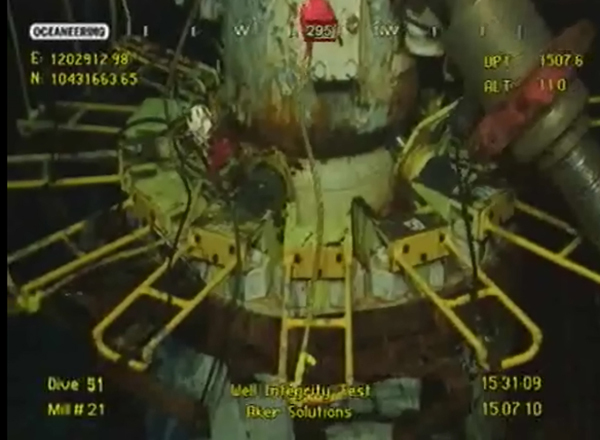BP temporarily stops Gulf oil leak
British oil giant BP said on Thursday that it has temporarily stopped oil leak from a blown-out well in the Gulf of Mexico after it placed a new cap over the leak.
 |
|
The new containment cap is seen during the "well integrity testing" in the image grabbed from the BP's live video feed in the Gulf of Mexico, July 15, 2010. British oil giant BP said Thursday the new cap on well is fully closed and no oil is going into Gulf during the well integrity test conducted by the company. [Xinhua/BP LIVE FEED] |
It is the first time for BP to completely contain the months-long leak triggered by the explosion of BP-leased Deepwater Horizon drilling rig off the Louisiana coast in late April.
BP's U.S. shares soared about 10 percent on Thursday after the London-based energy company announced that it has managed to choke off the spill as part of efforts to end the worst offshore leak disaster in U.S. history.
BP's Vice President Kent Wells said at a news briefing that oil leak stopped at 2:25 p.m. (1925 GMT) after engineers gradually dialed down the amount of oil flowing through the last of three openings on the 75-ton metal capping stack.
He said he was "really excited" that no oil was spewing into the Gulf of Mexico now, but warned that it was only the beginning of a long test process to evaluate the integrity of the well bore.
BP said in a press release on Thursday that during the integrity test, which will last between six to 48 hours, the three ram capping stack is closed, effectively shutting the well and all sub-sea containment systems have been temporarily stopped.
"Although it cannot be assured, it is expected that no oil will be released to the ocean during the test," BP said.
Even if no oil will be released during the test, this will not be an indication that oil and gas flow from the well bore has been permanently stopped, the press release said.
BP began the crucial test on Wednesday to determine whether the well bore, which stretches four km below the seabed, was damaged during the April 20 explosion of the Deepwater rig which sank two days later. If the well bore was damaged, cutting off the flow of oil from the top could force crude out in new leaks.
BP had planned to start the test on Tuesday, but postponed it to Wednesday due to an "overabundance of caution" about the effect the pressure could have on the leaking well.
On Monday, BP said in a press release that information gathered during the test will be reviewed with relevant U.S. government agencies including the federal science team to determine the way forward.
Options include reinstatement of containment as well as extending the test duration beyond 48 hours, it said.
The company removed the old capping device on Saturday to make way for the installation of the new and larger one.
With the new cap and oil-capture vessels, the company expects all crude oil that has been spewing into the ocean at a rate of about 60,000 barrels a day should be stemmed.
However, BP's chief operating officer Doug Suttles said, even if the cap works as planned, BP will continue to finish its two relief wells so that heavy drilling fluids, such as mud and cement, can be pumped in to seal the leaking once and for all.
On Monday, BP said the costs of cleaning up the oil gushing has climbed to 3.5 billion U.S. dollars, including the costs of the spill response, containment, relief well drilling, grants to the Gulf states, claims paid and federal costs.
As of Saturday, it had received 105,000 claims and made more than 52,000 payments, amounting to almost 165 million dollars.
 0
0 






